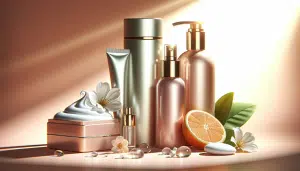Discover How Collagen Impacts Your Skin Health
Charlotte Stone September 28, 2025
Curious about the real benefits of collagen for glowing skin? Explore how this vital protein supports elasticity, hydration, and youthfulness, and learn what influences collagen production. Uncover skin-friendly routines and dietary tips to enhance your natural beauty.
Understanding Collagen’s Role in Your Skin
Collagen is often highlighted in conversations about radiant, youthful skin. This essential protein acts as a key building block, providing structure and strength to the skin’s foundation. Think of it as scaffolding that holds everything firm and smooth. When collagen is abundant, skin appears plump, lines are less visible, and overall tone is more even.
Collagen production naturally declines with age. Sun exposure, smoking, and poor nutrition can accelerate this process, making fine lines and loss of firmness more noticeable. The decline isn’t sudden; it’s gradual, starting as early as the mid-20s in some people. But the effects accumulate, gradually weakening the skin’s support network. Understanding this process helps set realistic expectations about skincare routines and lifestyle choices.
Science recognizes collagen as a critical factor in the appearance and resilience of the skin. Beyond surface beauty, its presence supports wound healing and barrier function. For anyone aiming to support healthy skin aging, knowing how collagen works lays a solid foundation. Small changes now can offer long-term changes, making this one of the most talked-about wellness topics today.
Factors That Influence Collagen Production
Multiple elements play a role in how much collagen your skin makes. Genetics, hormonal shifts, and especially environmental factors come together to influence the natural process of collagen synthesis. Exposure to ultraviolet (UV) rays from the sun tops the list of factors that can break down collagen fibers. Protecting your skin from intense sunlight is one of the most effective ways to maintain its structure.
Lifestyle habits like smoking are known to disrupt collagen formation. Tobacco smoke can increase free radicals and reduce the delivery of oxygen and nutrients to skin tissue. This oxidative stress accelerates the break-down of proteins, collagen included. On the other hand, balanced hydration and a diet rich in antioxidants help maintain a healthier skin environment for collagen creation.
Other contributors include stress, sleep quality, and even repeated facial expressions. When combined with poor nutrition, collagen synthesis can be compromised. Prioritizing sleep, reducing alcohol intake, and finding stress reduction methods all support natural skin repair cycles. Optimizing these elements has a significant, often visible, effect on the skin’s vibrancy and elasticity over time.
Dietary Approaches to Support Collagen Naturally
Food can influence how the body produces collagen. Amino acids, the building blocks of protein, are abundant in foods like chicken, fish, eggs, beans, and dairy. These provide glycine and proline, two amino acids central to collagen synthesis. Eating a balanced variety of these foods encourages optimal collagen production from within and helps nourish the skin’s deeper layers.
Vitamin C acts as a cofactor for enzymes involved in collagen formation. Citrus fruits, berries, bell peppers, and leafy greens are excellent sources. Consuming adequate vitamin C each day ensures the body can effectively repair and build collagen fibers. Zinc and copper, found in nuts, seeds, and shellfish, also play supporting roles in this complex chemical process.
What about collagen supplements? Some studies report that hydrolyzed collagen peptides may support skin hydration and elasticity, though more research is needed for conclusive results (Source: https://www.ncbi.nlm.nih.gov/pmc/articles/PMC6835901/). It’s also helpful to look at the overall dietary pattern. Minimizing added sugars and processed foods will further protect both existing collagen and your skin’s overall health.
Topical Skincare Practices That Target Collagen
Many creams and serums today claim to boost collagen in the skin. While not all topical products can penetrate deep enough to stimulate new collagen, certain ingredients do support skin resilience. Retinoids, a form of vitamin A, help encourage natural collagen production. These are available both over the counter and by prescription for those seeking stronger results.
Peptides are another group of ingredients found in advanced skincare products. They serve as communication molecules. When applied, they signal the skin to ramp up its natural repair processes, including collagen synthesis. Consistency is key; regular use, combined with sun protection, delivers more noticeable benefits than sporadic application.
Don’t overlook broad-spectrum sunscreen. Protecting skin from harmful UV rays prevents collagen degradation — one of the most critical steps in long-term skin maintenance. Layering antioxidants, such as vitamin C serums, under daily SPF can offer dual protection. For those exploring advanced options, in-office procedures like microneedling and light-based treatments may offer additional collagen stimulation (Source: https://www.aad.org/public/everyday-care/skin-care-secrets/anti-aging/topics).
Collagen Loss: Signs and Ways to Respond
How can one notice declining collagen levels? Fine lines around the eyes and mouth often appear first. Thinning skin, bruising more easily, and less plump cheeks are other common signs. These changes aren’t immediate, but a combination of them signals an underlying shift in collagen density and organization.
Responding proactively makes a difference. Gentle exfoliation and moisturizer support skin turnover and barrier repair. Hydrating ingredients such as hyaluronic acid lock in moisture, reducing the visible impact of diminished collagen. Avoiding excessive face washing and harsh cleansers also protects the skin’s natural lipid barrier.
If these strategies are handled early, smoother texture and improved radiance can be sustained for longer. Ultimately, everyone experiences collagen loss at a unique pace — genetics and environment both play parts. Adopting protective habits, nourishing your body, and seeking new topical science add up to a holistic, achievable path for long-term skin vibrance.
Lifestyle Habits to Preserve Skin Youthfulness
Supporting collagen through conscious lifestyle habits offers long-lasting rewards. Prioritizing restful sleep, regular exercise, and routine hydration keeps the skin and its support matrix in peak condition. Even short walks boost blood flow and nutrient delivery, fueling the building and repair of collagen-rich tissue.
Blue light from screens and chronic stress may have subtle effects on skin quality. Scheduling breaks from digital devices, creating calming routines, and finding stress reduction techniques like meditation or yoga help support overall wellness. These practices contribute to an environment where collagen can thrive, supporting your skin’s resilience from the inside out.
Finally, maintaining balance and moderation in nutrition and exposure to environmental stressors pays off. Regular wellness checkups, mindful movement, and investing in science-backed skincare products are part of a sustainable approach. Over time, these small changes serve as building blocks for a complexion that reflects both confidence and natural health.
References
1. Sorg, H., et al. (2018). Skin Wound Healing: The Effect of Collagen. Retrieved from https://www.ncbi.nlm.nih.gov/pmc/articles/PMC6031918/
2. National Institutes of Health. (2020). Collagen: What Is It and What Are Its Uses? Retrieved from https://ods.od.nih.gov/factsheets/Collagen-Consumer/
3. American Academy of Dermatology Association. (n.d.). Skin care and aging. Retrieved from https://www.aad.org/public/everyday-care/skin-care-secrets/anti-aging/skin-care
4. Cleveland Clinic. (n.d.). Collagen: What it is, Types, Function & Benefits. Retrieved from https://my.clevelandclinic.org/health/articles/23089-collagen
5. Zague, V. (2008). A New View Concerning the Effects of Collagen Hydrolysate Intake on Skin Properties. Retrieved from https://pubmed.ncbi.nlm.nih.gov/18416885/
6. Harvard T.H. Chan School of Public Health. (n.d.). The Nutrition Source: Collagen. Retrieved from https://www.hsph.harvard.edu/nutritionsource/collagen/







